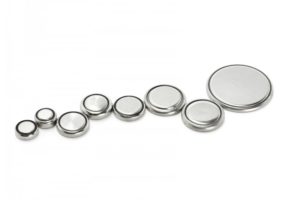
Lithium batteries can be found in electronics all over your home, but they have been in the news lately for the growing safety hazard they represent to children. If swallowed or put up your kid’s nose, these batteries, also known as “button” batteries, can cause injury or even death. Because they are so small (about the size of a nickel) and easily accessible, more children every year are swallowing these shiny objects. Button batteries can be found in any number of objects around your house, including talking and singing books, flameless candles, musical greeting cards, and even children’s toys. Unfortunately, many of these devices have easy-to-open battery compartments, meaning your kids can get to them quickly and easily.
In 2014, over 3,200 cases of kids ingesting button batteries were reported to Poison Control. Tragically, 16 children since 2006 have died from the harm caused by these batteries. The problem has become so serious that the American Academy of Pediatrics (AAP) has developed a Button Battery Task Force to educate parents and caregivers about the dangers of battery ingestion in children.

Once inside your child’s body, they can do damage very quickly. The moisture within your child’s nose and throat touching the battery causes an electrical current. This current in turn causes a chemical reaction that can burn or otherwise injure your child in as little as two hours.
Even worse, doctors often have trouble diagnosing the problem. This is because the symptoms of button battery poisoning can often mirror other illnesses. These symptoms include crying, drooling, coughing, difficulty swallowing, and chest discomfort or pain. X-rays of the battery can also look like a coin or other less harmful object, which can make it difficult to know the amount of harm being done internally. This delay in diagnosis and treatment can mean even further damage is done to your child’s insides. Even after the battery is removed, the injury can be difficult and painful to fix, possibly requiring multiple surgeries and breathing tubes while your child recovers.
If you suspect your child has swallowed a button battery:
- Take your child to the ER IMMEDIATELY. This is an emergency!
- Do not give your child anything to eat or drink to vomit or otherwise dislodge the battery.
- Do not attempt to remove the battery yourself, as this could cause further harm.
- Tell the doctor that you think it might be a button battery.
- Insist upon X-rays.
The best way to protect your child from the dangers of lithium batteries is to make sure they never come in contact with them. Know what electronics in your home contain these batteries and make sure the batteries are secured firmly within the device. Also make sure your child is supervised at all times whenever they are playing with devices that contain button batteries. Their safety depends on it.



